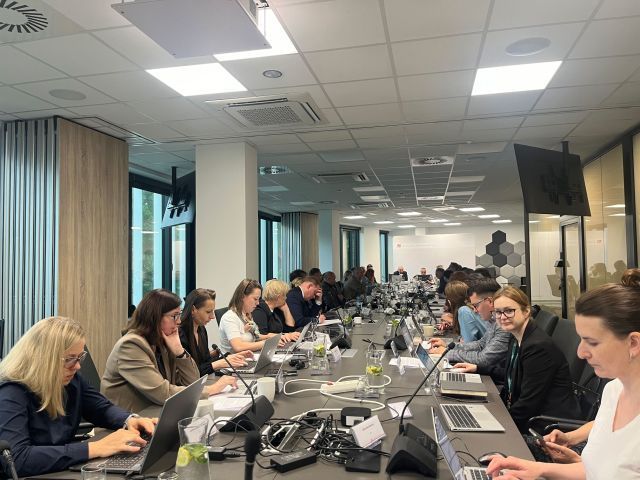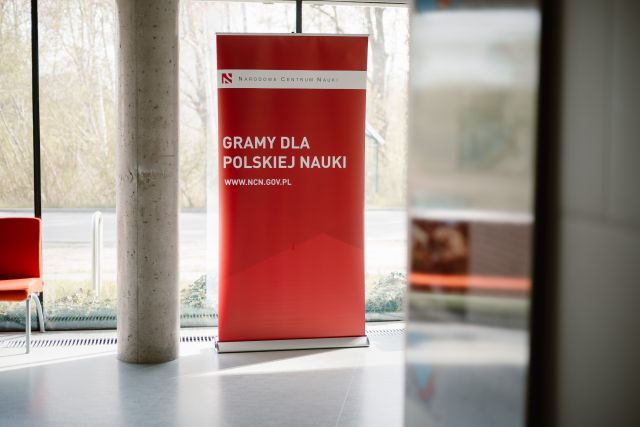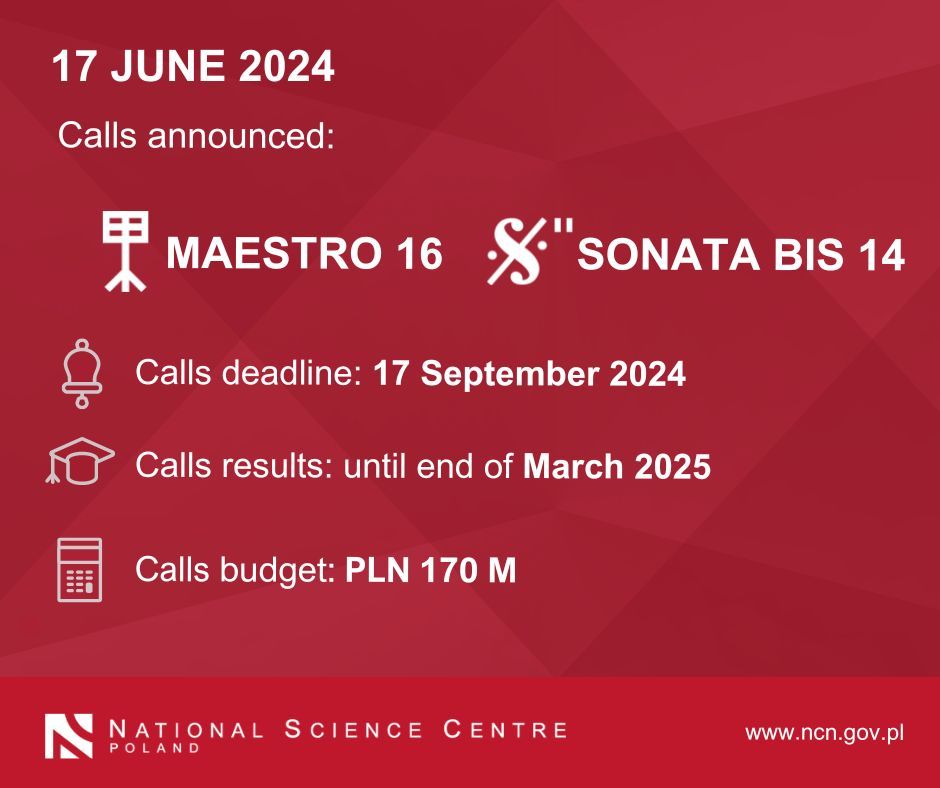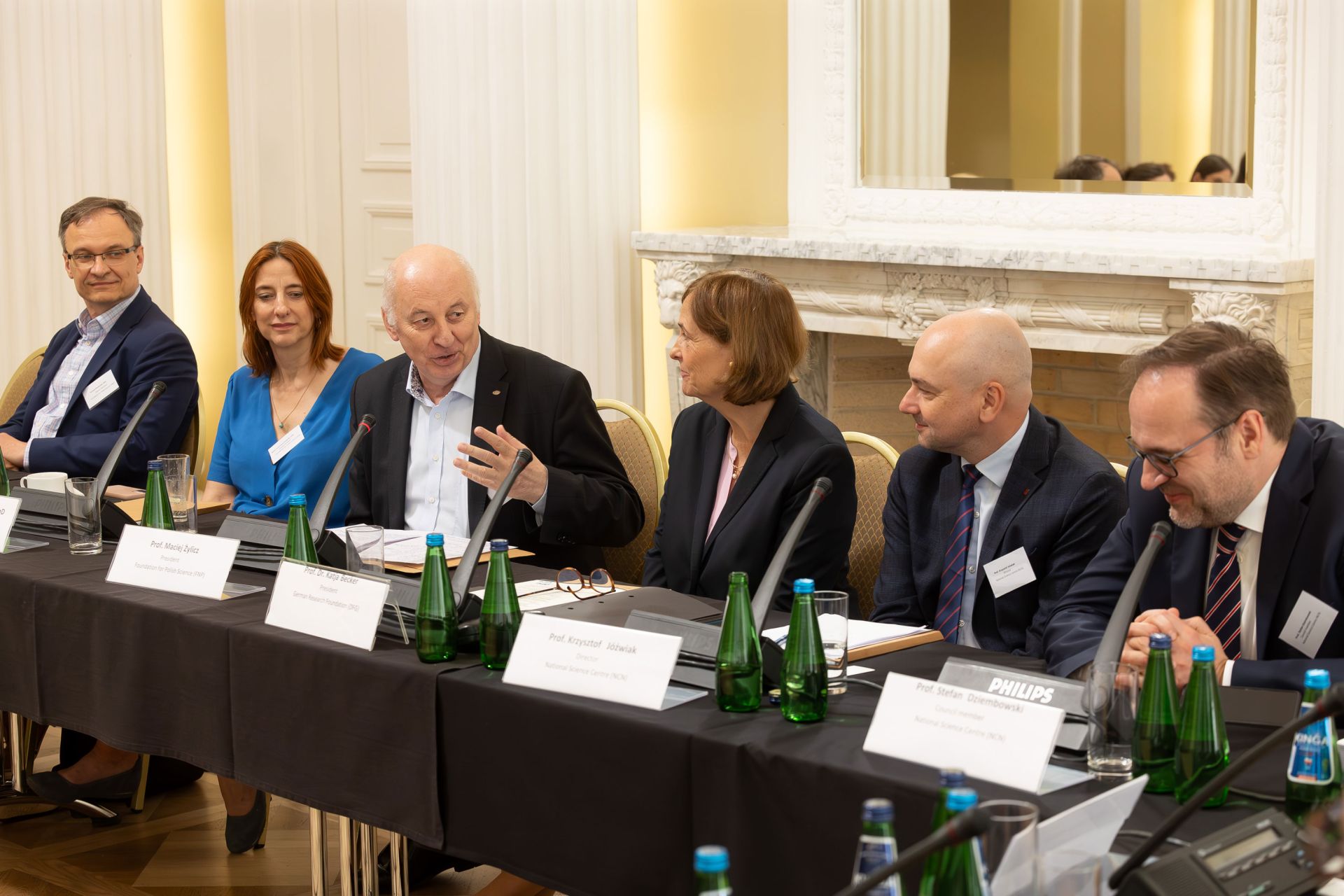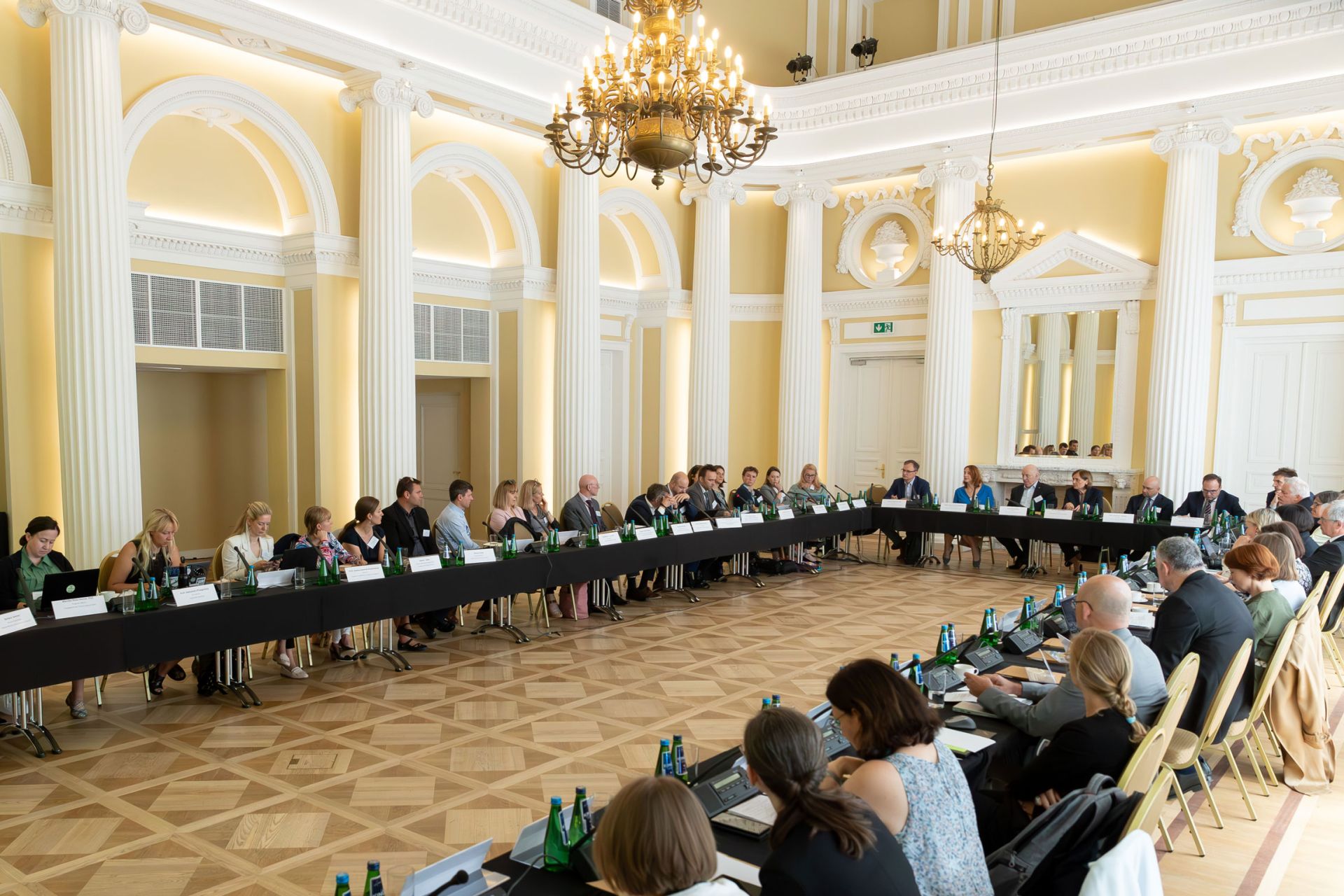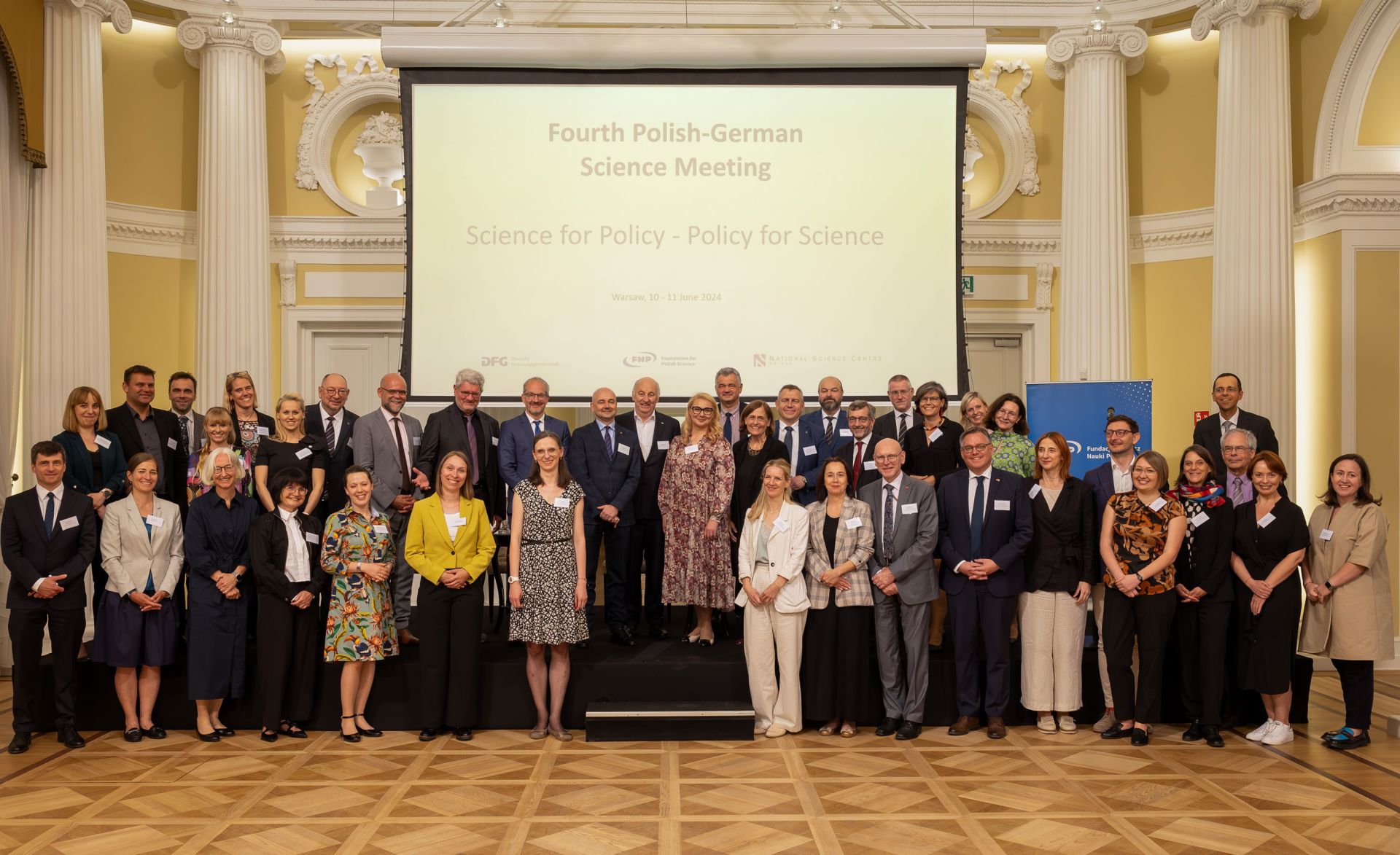Researchers from Bydgoszcz, Gliwice, Lodz, Szczecin, Warsaw and Wroclaw among winning applicants of prestigious IMPRESS-U. Projects will be carried out in international collaboration with US and Ukrainian scientists. NCN will award over 7.3 million zlotys for that purpose.
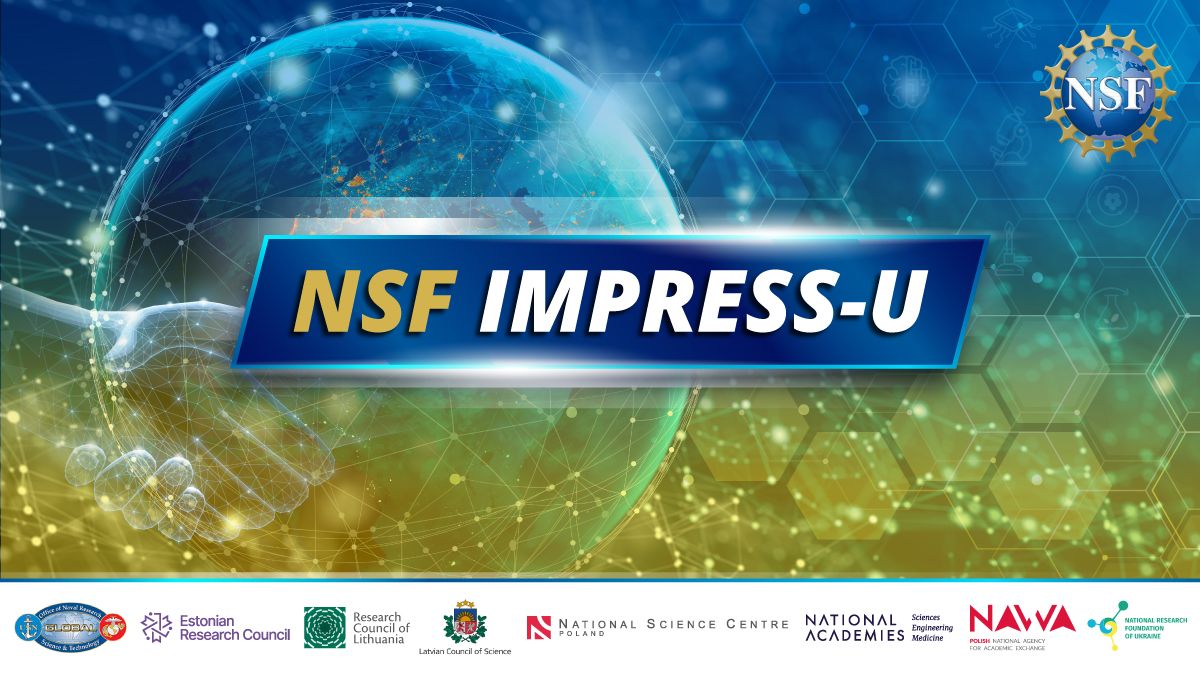 IMPRESS-U opens up new opportunities for cooperation between Polish researchers and their colleagues from Ukraine and USA as well as, optionally, Baltic countries: Lithuania, Latvia and Estonia. The International Multilateral Partnerships for Resilient Education and Science System in Ukraine (IMPRESS-U) has been initiated by the US National Science Foundation (NSF). The National Science Centre and the Polish National Agency for Academic Exchange are the programme partners.
IMPRESS-U opens up new opportunities for cooperation between Polish researchers and their colleagues from Ukraine and USA as well as, optionally, Baltic countries: Lithuania, Latvia and Estonia. The International Multilateral Partnerships for Resilient Education and Science System in Ukraine (IMPRESS-U) has been initiated by the US National Science Foundation (NSF). The National Science Centre and the Polish National Agency for Academic Exchange are the programme partners.
IMPRESS-U aims to support excellence in science and engineering research, education, and innovation through international collaboration, and to promote and catalyse integration of Ukrainian researchers in the global research community.
The NCN is open to proposals for basic research projects covering the subject area of the EAGER call. IMPRESS-U projects must be based on a balanced and complementary contribution from all the research teams involved in the project. The principal investigator of the Polish research team must hold at least a PhD degree. Co-investigators can be involved in the project work, including students, PhD students and post-docs. Projects must be performed over 24 months and the budget must include the cost of salaries and scholarships, research equipment, devices and software.
Joint proposals are subject to a merit-based evaluation pursuant to the Lead Agency Procedure performed by the National Science Foundation acting as the Lead Agency. furthermore, Polish research teams must submit a funding proposal to the NCN, identifying their research tasks.
How to improve remote sensing – satellite lidars + machine learning
Remote sensing is a process of measuring objects or areas from a distance, typically from aircraft, space or Earth’s terrestrial area. Apart from radars and sonars, satellite lidars are an important element of remote sensing systems enabling measurement of the topological structure of the Earth's surface (including forests, rivers and water reservoirs, desert, grassy and urbanised areas). The analysis carried out on such data allows us to deepen our understanding of many phenomena taking place on Earth, in particular the processes occurring in the ecosystem that determine the circulation of nutrients, water and carbon on Earth. However, the current measurement capabilities of satellite lidars are limited both in terms of spatial resolution and range.
 Prof. Krzysztof Okarma, photo credit: Aurelia Kołodziej
Researchers from the West Pomeranian University of Technology in Szczecin under the supervision of Prof. Dr hab. inż. Krzysztof Okarma, in collaboration with their partners from the United States and Ukraine, have received an IMPRESS-U grant for exploratory research on generative compression for compressive lidars. They will receive 400 thousand zlotys for their research from the National Science Centre.
Prof. Krzysztof Okarma, photo credit: Aurelia Kołodziej
Researchers from the West Pomeranian University of Technology in Szczecin under the supervision of Prof. Dr hab. inż. Krzysztof Okarma, in collaboration with their partners from the United States and Ukraine, have received an IMPRESS-U grant for exploratory research on generative compression for compressive lidars. They will receive 400 thousand zlotys for their research from the National Science Centre.
Krzysztof Okarma studies the field of digital image quality assessment and image similarity, as well as other problems of machine and computer vision, and application of image analysis methods, including interdisciplinary ones. Under IMPRESS-U, he will carry out a research project in tandem with the research team of Prof. Volodymyr Lukin from the National Aerospace University in Kharkiv with whom he has already worked. They will study the image quality assessment under the project funded by the Polish National Agency of Academic Exchange in cooperation with the Ministry of Education and Science of Ukraine.
“During our talks it turned out that these issues can be applied in the generative compression used to measure data from satellite lidars studied by the research team of Prof. Gonzalo Arce from the University of Delaware, USA. We have discussed the requirements of the American team and possible collaboration with the Ukrainian team in the development of the loss function in view of our prior experience and decided to apply for IMPRESS-U funding,” says Krzysztof Okarma.
The aim of the international project is to investigate the possibility of using machine learning methods, in particular for deep neural networks, to reconstruct a three-dimensional image of the terrain based on data from a compression satellite lidar obtained from an altitude of several hundred kilometres with a quality comparable to the results obtained from an altitude of several hundred metres. The Polish team, acting in close cooperation with the team from Ukraine, will develop appropriate loss functions, in particular based on the adaptation and modification of previously proposed combined image quality metrics for various types of images, and will verify them for satellite and aerial measurement data provided by the team from the University of Delaware.
“I hope that the implementation of the IMPRESS-U project will let us strengthen cooperation with the research teams from Kharkiv and the University of Delaware. A few young researchers will be involved in the research work, so hopefully they will get involved in the subject of our research and my team will expand their research interest,” concludes Krzysztof Okarma.
Reconstruction and environmental sustainability
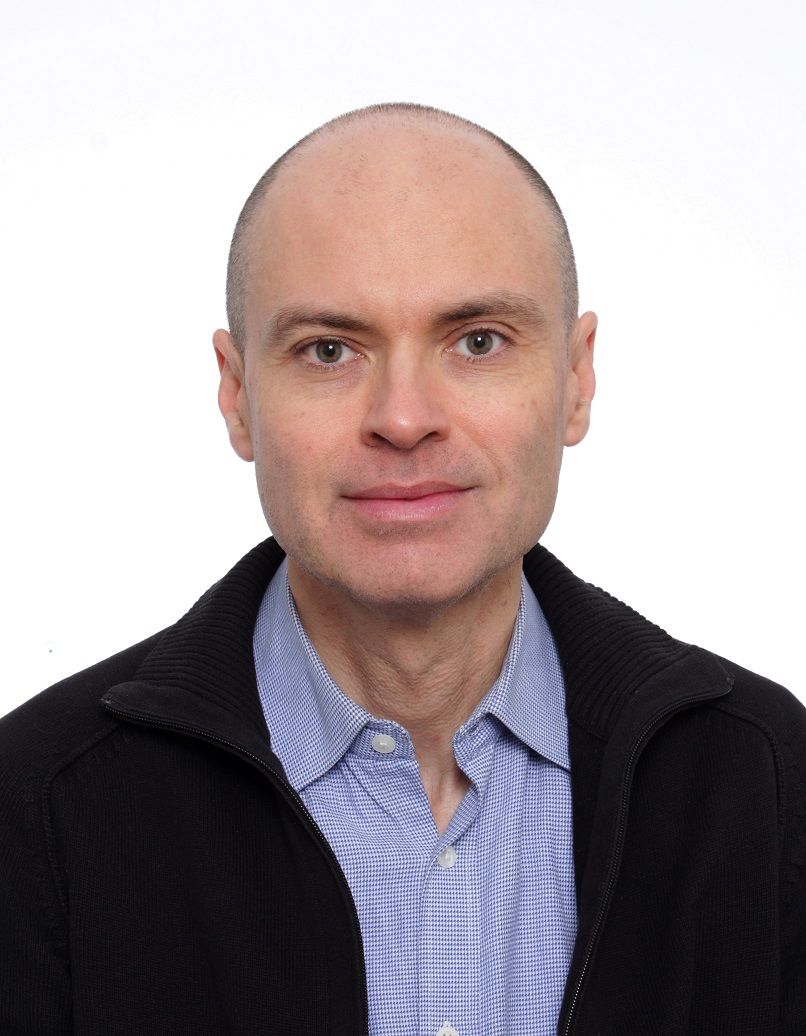 Dr hab. Eng Maciej Dutkiewicz, prof. PBŚ
The war in Ukraine caused by the Russians aggression inflicts damage to infrastructure, public facilities, and residential buildings day after day. Therefore, researchers need to develop construction technologies with the use of readily available materials of sufficient quality and resilience to effectively rebuilt what has been destroyed in a short period of time.
Dr hab. Eng Maciej Dutkiewicz, prof. PBŚ
The war in Ukraine caused by the Russians aggression inflicts damage to infrastructure, public facilities, and residential buildings day after day. Therefore, researchers need to develop construction technologies with the use of readily available materials of sufficient quality and resilience to effectively rebuilt what has been destroyed in a short period of time.
The research team headed by Dr hab. inż. Maciej Dutkiewicz, prof. PBŚ from the Bydgoszcz University of Science and Technology will develop new approaches and structural materials to rebuild damaged Ukrainian infrastructure with environmental sustainability considerations. The researchers will carry out an IMPRESS-U project in collaboration with research teams headed by Prof. Alexander Orlov from the New York University, USA and Prof. Maryna Sukhanevych from the Kyiv National University of Construction and Architecture. The NCN will award nearly 1.3 million zlotys for the research tasks of the Polish research team.
Maciej Dutkiewicz’s research focuses on cement-based and cement-free eco-friendly composites, metallic and non-metallic fibre-reinforced concretes and mortars, structural health monitoring using the modal analysis, spectral method as well as machine learning and digital image correlation. He also monitors and reduces structural vibrations and investigates fracture resistance of structural components.
“I have had a long-standing research relationship with the Ukrainian partners. The current situation has already prompted me to get involved in various aid activities, and IMPRESS-U is a great opportunity to take up an important research subject and continue our previous collaboration,” says Maciej Dutkiewicz.
The main research goal is to develop eco-friendly technologies of 3D printed and tradition concrete structures using a combination of highly and moderately processed waste materials. In the project, the researchers will analyse the possibility of using recycled concrete aggregates (RCA) for the concrete production as well as other waste materials, such as fly ash, bricks, glass, and even processed food or agricultural waste. The number of components in a mixture will depend on designation for the construction of individual infrastructure facilities. The utilisation of waste materials in construction will pose unprecedented technological challenges. Due to the inhomogeneous nature of components used to design composites, they will be meticulously examined in terms of durability as well as mechanical and thermal properties and even self-healing properties achieved by using waste with variable particles. The research team will also conduct an innovative Life Cycle Analysis (LCA) analysis for the waste-based aggregates’ preparation as a function of their size and chemical composition.
“The main purpose of our project is to use the research findings to support reconstruction of Ukraine’s damaged infrastructure,” emphasises Maciej Dutkiewicz.
Deep below the surface – groundwater resources in Europe
Dr hab. Tatiana Solovey, Professor at the Polish Geological Institute, National Research Institute is among the winning applicants of the IMPRESS-U call. Her daily work involves satellite gravimetry-based monitoring of groundwater resources. She also pursues the issue of water management in transboundary regions.
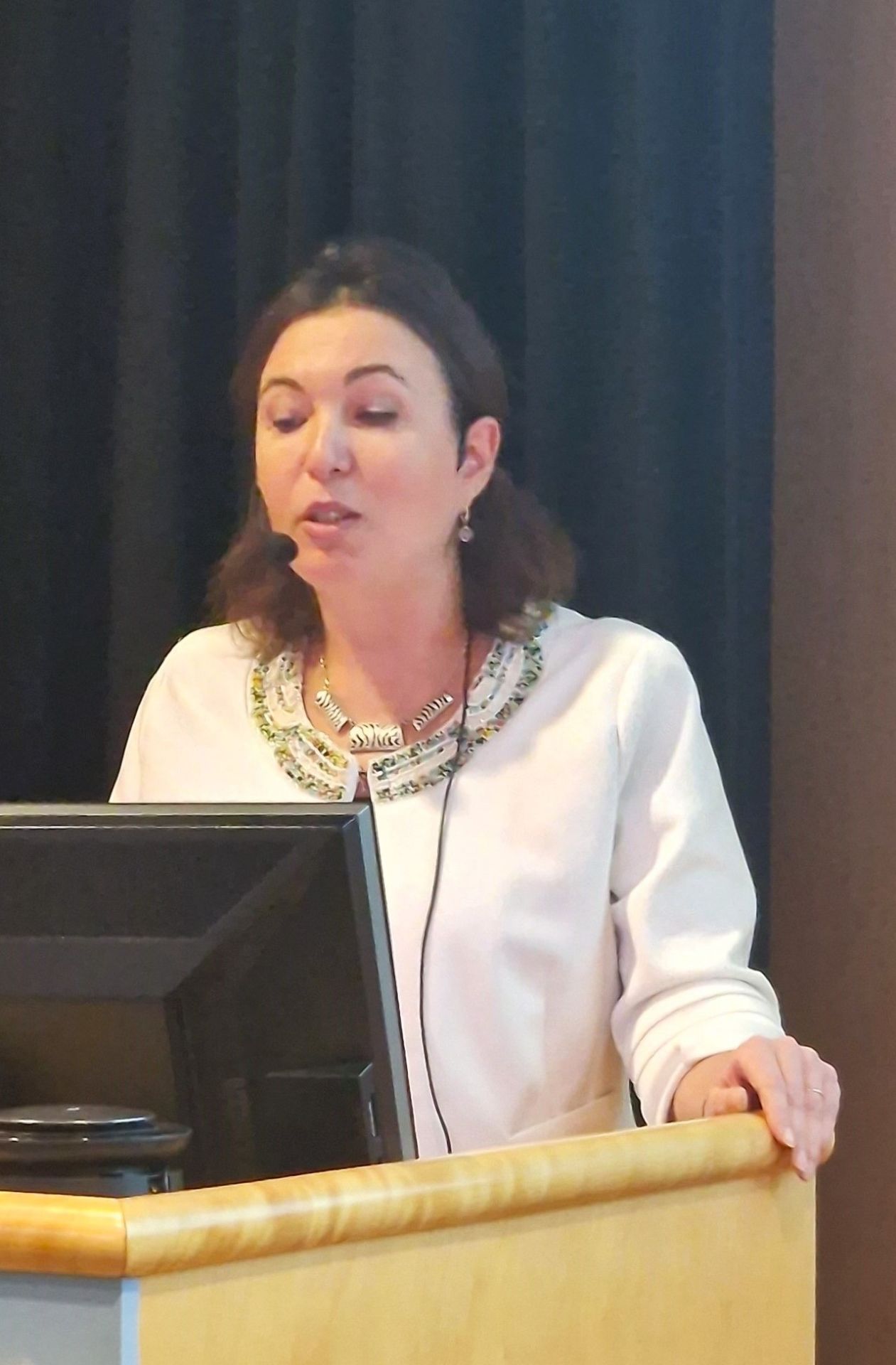 Dr hab. Tatiana Solovey, Prof. PIG –PIB
“Applying for IMPRESS-U funding was a logical consequence of my earlier research conducted under the “EU-Waterres” project by the consortium of ten partners from five countries.
Dr hab. Tatiana Solovey, Prof. PIG –PIB
“Applying for IMPRESS-U funding was a logical consequence of my earlier research conducted under the “EU-Waterres” project by the consortium of ten partners from five countries.
The project enabled us to create a tool for coordinated management and integrated protection of transboundary groundwater which is closely connected with the subject of IMPRESS-U due to knowledge gaps that I managed to identify”, says Tatiana Solovey.
The NCN funding of nearly PLN 1.42 million will enable Dr hab. Solovey together with Dr Justyna Śliwińska-Bronowicz from the Space Research Centre of the Polish Academy of Sciences to take part in the international research project GRANDE-U. Researchers from Poland, Ukraine, the United States, Lithuania, Latvia and Estonia will join their knowledge and experience to assess groundwater resilience through integrated data exploration for Ukraine. Groundwater is one of the most important natural water resources and a primary source of freshwater on Earth. Compared to surface water, groundwater is generally of higher quality, more resistant to possible contamination, less susceptible to fluctuations and much more evenly distributed. Groundwater can be used for consumption purposes, as well as for agriculture and industry. In response to the observed climate changes, it is crucial to continuously monitor Earth’s groundwater resources and to develop and share acquired data so that it could be used by relevant agencies for decision-making that affects the economy and society.
“I had the pleasure of working with most of the partners before. The consortium coordinator Dr Ilya Zaslavsky from the University of Californian San Diego contacted me last year when she found online information on the EU-Waterres project,” says Tatiana Solovey.
The aim of the GRANDE-U project is to develop a high-resolution database on groundwater resources for the Baltic countries, Poland and Ukraine, with particular emphasis on the border areas of Ukraine. Researchers from six different countries will join their forces in order to integrate the data acquired from many sources using various methods for a detailed analysis of changes in groundwater resources and integrated assessment of water balance and transboundary flows from the Poland-Ukraine border area.
“I hope that my work will result in many scientific publications and development of a new groundwater measurement method that will be frequently used by the world geological authorities. I also look forward to enhancing the position of my Institute as a recognisable and respected establishment in pioneering hydrogeology research,” Dr hab. Solovey concludes.
Pioneering solutions vs delicate quantum states – how to improve quantum computers
Quantum computers are cutting-edge devices underpinning the principles of quantum mechanics. Researchers and commercial companies all over the world have been working on quantum computers for years, taking part in the race to achieve the highest possible computational efficiency, far beyond the capabilities of traditional computers. At the heart of this advanced technology is the quantum bit, or qubit, which is the basic unit of quantum information processing. Apart from their tremendous potential, they also face an inherent obstacle: qubit decoherence, a phenomenon causing the loss of delicate quantum states and introducing computational inaccuracies.
The research team headed by Prof. Dr hab. Ryszard Buczko from the Institute of Physics, Polish Academy of Sciences, will be involved in the international project “Quantum dynamics in novel chalcogenide materials and devices” with funding granted under IMPRESS-U.
In his research work, Ryszard Buczko performs theoretical studies of crystal properties and low-dimensional nanostructures. He has recently shown an interest in narrow-gap IV-VI semiconductors.
“Our project funded under IMPRESS-U aims to explore the potential of lead- and tin-chalcogenide (IV-VI) semiconductors, nanostructures fabricated on their basis and nanostructures coupled with superconductors. So far, they have not been extensively studied in the field of quantum information science. We assume that their unique physical properties, i.e. strong spin-orbit interactions, high electron mobility, and effective electrostatic control, enable the reduction of qubit decoherence. Additionally, they may be used to investigate new quantum phenomena in nanoscale devices,” explains Ryszard Buczko.
“Research teams headed by Prof. Denys Bondar from the Tulane University, USA and Prof. Sergey Frolov from the University of Pittsburgh, USA as well as researchers from Ukraine headed by Andrii Terekhov from the B. Verkin Institute for Low Temperature Physics and Engineering (ILTPE) in Kharkiv will also be involved in the project work.
“I found out about the project from Valentyn Volobuiev with whom I have co-authored a number of publications. In our Institute, Valentyn grows IV-VI nanostructured materials by molecular beam epitaxy (MBE). I was keen to explore if they could be used for quantum computing,” says Ryszard Buczko.
Our project partners include theoreticians, experimentalists, and crystal growers representing various fields and disciplines. Our common mission involves fabricating and characterising new nanostructures, as well as constructing and studying prototypes of quantum devices. Researchers from the Institute of Physics, Polish Academy of Sciences will support theoretical work to design appropriate nanostructures, fabricate them and characterise them in situ. Coupled with the structures fabricated by the researchers from Kharkiv, they will be used for samples to investigate quantum dynamics of spin qubits in quantum dots and Joseph junction transmons.
The National Science Centre will allocate over 1.34 million zlotys for research conducted at the Institute of Physics, Polish Academy of Sciences.
Epidemics in military conflicts under international scrutiny
Military conflicts provide a fertile ground for infectious diseases to spread. In times of war, the mechanisms allowing a stable epidemiological situation of a country to be maintained in peacetime are disrupted, e.g. access to health infrastructure is hindered, epidemiological and sanitary situation is worsened. Relocation and migration are among the reasons why people are crowded in temporary shelters and refugee camps, which is why they have less access to food and water, drugs and healthcare. Furthermore, migration facilitates dissemination of new pathogen mutations and weak immune system caused by conflict-related stress makes people more susceptible to diseases. Not only conflict zones but also other areas are at risk of epidemics, for example due to mass migration. In this situation, forecasting epidemics spread holds paramount significance.
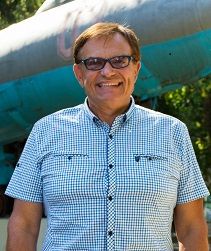 Doc. Dr hab. Sergiy Yakovlev
The research team headed by Dr hab. Sergiy Yakovlev will carry out the following IMPRESS-U project: “Modelling and forecasting of infection spread in war and post war settings using epidemiological, behavioural and genomic surveillance data”. The researchers from the Institute of Mathematics, Lodz University of Technology will cooperate with the scientists from the Łukasiewicz Research Network – PORT Polish Centre for Technology Development headed by Heng-Chang Chen, partner research teams from the Georgia State University, USA headed by Alexander Kirpich and University of Connecticut, USA headed by Pavel Skums, and research team from the Kharkiv National Medical University headed by Tetyana Chumachenko and Lyubov Makhota from the Kharkiv Regional Centre for Disease Control and Prevention, Ministry of Health of Ukraine.
Doc. Dr hab. Sergiy Yakovlev
The research team headed by Dr hab. Sergiy Yakovlev will carry out the following IMPRESS-U project: “Modelling and forecasting of infection spread in war and post war settings using epidemiological, behavioural and genomic surveillance data”. The researchers from the Institute of Mathematics, Lodz University of Technology will cooperate with the scientists from the Łukasiewicz Research Network – PORT Polish Centre for Technology Development headed by Heng-Chang Chen, partner research teams from the Georgia State University, USA headed by Alexander Kirpich and University of Connecticut, USA headed by Pavel Skums, and research team from the Kharkiv National Medical University headed by Tetyana Chumachenko and Lyubov Makhota from the Kharkiv Regional Centre for Disease Control and Prevention, Ministry of Health of Ukraine.
Sergiy Yakovlev’s research interest includes modelling and development as well as AI implementation in healthcare and related areas.
“Researchers from the Universities of Connecticut and Georgia State University approached me and suggested that I should take part in the IMPRESS-U call. They learnt about my achievements from the papers I had published in prestigious academic journals. I have never met them before. I got very interested in their idea. I was also familiar with the research focus of the Ukrainian research team and knew that they had a large amount of statistical data on the transmission of infectious diseases in the Kharkiv Region and throughout Ukraine. I have contacted the Kharkiv National Medical University, and we organised an online meeting with the American research team. This is how our team was created,” says Sergiy Yakovlev.
The primary objective of this project is to create epidemiological models and optimisation algorithms for analysing epidemiological dynamics under conflict and post-conflict scenarios. The project findings will support public health decision-making during conflicts, reducing the overall health impact.
Our international research team applies an interdisciplinary approach that integrates current advances in computational biology, mathematical epidemiology, machine learning, and operations research. The Polish team includes experts in mathematical modelling in epidemiology, dynamical systems and nonlinear analysis, machine learning and fractal analysis, optimisation and operations research. US scientists specialise in mathematical epidemiology, genomic epidemiology and computational biology projects, while our Ukrainian colleagues have contextual knowledge and will provide statistical data, which will be complemented by information from publicly available sources.
Polish researchers from the Lodz University of Technology and Łukasiewicz Research Network – PORT Polish Centre for Technology Development will receive nearly 1.67 million zlotys from the National Science Centre for their research conducted under IMPRESS-U.
Recent years have seen many events, such as COVID pandemic, supply chain interruptions, geopolitical conflicts, and military conflicts. They have significantly impacted the infrastructure of individual countries as well as entire regions. Therefore, it is paramount to analyse the capability of systems to recover from disruption. The research team under the leadership of Dr hab. inż. Krzysztof Grochla from the Institute of Theoretical and Applied Informatics, Polish Academy of Science will participate in a research project “Infrastructure Recovery through Resilience Stress Testing in Ukraine”. The project will be funded under IMPRESS-U. Krzysztof Grochla will carry out his research in collaboration with the research teams of Dr Rafael Munoz-Carpena from the University of Florida, USA, Dr Volodymyr Artemchuk from the G.E. Pukkov Institute for Modelling in Energy Engineering NAS in Ukraine, Prof. Marius Laurinaitis from the Mykolas Romeris University, Lithuania and Dr Andrii Chuba from the Tallin University of Technology.
Under his daily work, Krzysztof Grochla studies performance evaluation of wireless networks, protocol design and development of communication methods in such networks.
“IMPRESS-U appeared to me as a great opportunity to expand our research and find new applications thanks to the international collaboration. We have cooperated with Ukrainian researchers in the past and they helped us liaise with scientists from the United States and develop a project for which other partners were acquired”, says Krzysztof Grochla.
The goal of the project is to validate the hypothesis that the recovery and resilience of systems can be quantified via stress-testing of interconnected networks representing their systemic functions. Researchers will apply the Resilience-Recovery Under Attack (RRUA) method to quantitatively explore distinct system response stages to attacks and serious failures. They will employ a multi-faceted methodology combining network science, resilience analytics, explainable AI (xAI), and digital twin technologies. The team from the Institute of Theoretical and Applied Informatics, Polish Academy of Science will focus on creating mathematical models and computer simulations to show how various systems, such as communication and power networks, recover after major failures or disasters.
“We hope to use research methodology developed for wireless network modelling to analyse the reliability of energy grid and other complex systems. International collaboration will hopefully enable us to generalise our models to capture the recovery of complex systems after a collapse and verify them based on airport and power grid data,” emphasises Krzysztof Grochla.
Under IMPRESS-U, the Polish research team will receive over 1.23 million zlotys from the National Science Centre for their research conducted in cooperation with foreign partners from the United States of America, Ukraine, Lithuania and Estonia.
First research projects funded by the NCN under IMPRESS-U are already underway at the University of Opole and University of Rzeszów.
Under IMPRESS-U, the Polish members of the research team requesting funding within the framework of the International Supplements for projects performed at the NSF can only apply for funding from the Polish National Agency for Academic Exchange (NAWA)
Under IMPRESS-U, the National Science Centre will award 17 million zlotys for the Polish research teams. Research teams interested in the call can use the partner search tool for the purposes of IMPRESS-U projects.
IMPRESS-U Call Announcement

